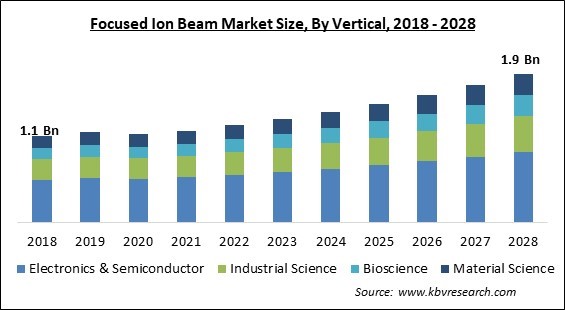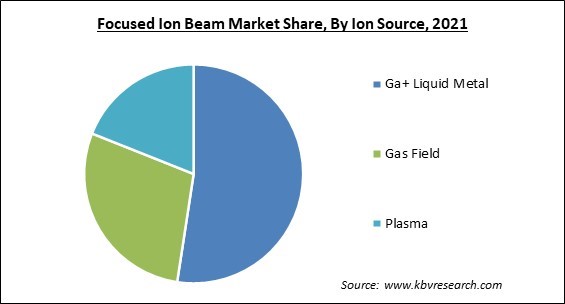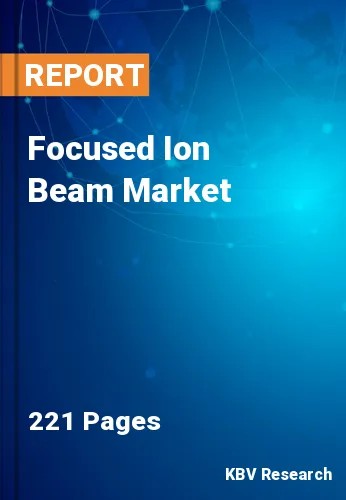The Global Focused Ion Beam Market size is expected to reach $1.9 billion by 2028, rising at a market growth of 7.3% CAGR during the forecast period.
Focused ion beams or FIB are generated to focus on the point source’s image by using electrostatic lenses onto a substrate and then its precise deflection. These beams usually have a diameter smaller than a meter. FIB-capable equipment generates focused ion beams that have high energy. This technology is vastly used in the semiconductor industry and 3D imaging.

The site-specific investigation, deposition, and destruction of materials using a focused ion beam are utilized mostly in semiconductor devices and materials’ research. The technology’s use in the biological field is progressing as well. FIB systems have been manufactured commercially, mostly for significant semiconductor producers.
Similar to the generation of beams in a scanning electron microscope (SEM), especially in terms of operation, a finely focused beam of ions (often gallium) is utilized in FIB systems as well. These ions can be operated at high beam currents for site-specific milling or sputtering or low beam currents for imaging. Until recently, the semiconductor industry predominantly used FIB systems and associated technologies.
With the help of FIB, applications like circuit modification, defect analysis, photomask repair, and the production of site-specific samples for transmission electron microscopy (TEM) have become standard practices. Modern FIB systems offer high-resolution imaging capabilities, and when combined with in situ sectioning, they have often rendered the necessity for SEM examination of FIB-sectioned specimens irrelevant.
The use of focused ion beams has increased in the semiconductor industry significantly as a device that is used extensively in consumer electronic goods along with its use in research activities like space research, biomedical engineering, etc. A lack of raw materials needed for semiconductor production resulted in the decreased manufacturing of it, which had ripple effects in various industries. Consequently, this reduced the demand for focused ion beam. The lockdown restrictions of the pandemic also lowered the application of FIB in research.
In general, material science deals with developing and discovering new methods and materials for various research and studies. Since testing and characterization of materials are crucial before their utilization, appropriate testing methods are required by the industry. The newly discovered or developed material can be used in any of the subdivisions of the field, namely photonic and electronic materials, biomaterials, organic materials, smart materials, composite and structural materials, and nanomaterials. As a result, exponential growth is being witnessed in the utilization of FIB systems in numerous research activities associated with the field.
The process of developing integrated circuits (ICs) by scanning FIB across a patterned surface is called ion beam lithography. Focused ion beams offer better patterning with higher resolution in comparison to other methods like electron beam lithography, X-ray, or UV. Focused ion beam systems are also preferred over these methods because of their improved backscattering, sensitivity resistance, and proximity effects. Additionally, unlike the lithography process done by electron beam where scissoring or cross-linking of the resist layer is induced by primary as well as secondary electrons, ion beam lithography depends on secondary electrons of short range.
Analysis of FIB equipment and the recommendations leading to improvement includes the utilization of numerous techniques, technical expertise, and equipment. For example, the failure analysis of damaged or faulty chips in the decapsulation needs to be performed by skilled engineers. This is because experienced professionals can quickly identify and segregate the reason for the fault of the chips. Moreover, qualified engineers are capable of reencapsulation of chips as per their designated places for proper functioning.
On the basis of application, the focused ion beam market is divided into failure analysis, nanofabrication, device modification, circuit edit, and counterfeit detection. The nanofabrication segment witnessed a promising growth rate in the focused ion beam market in 2021. The increasing interest of researchers in developing robust nanofabrication technologies, mainly for the formation of 3D devices and structures, is a significant factor that expedites the growth of the segment.

Based on ion source, the focused ion beam market is categorized into Ga+ liquid metal, gas field, and plasma. The gas field segment procured a considerable growth rate in the focused ion beam market in 2021. The use of gas field ion source (GFIS) is increasing because of the growing technological advancements that have successfully integrated the technology into the FIB systems.
Based on vertical, the focused ion beam market is segmented into electronics & semiconductor, industrial science, bioscience, and material science. The electronics and semiconductor segment garnered the maximum revenue share in the focused ion beam market in 2021. The FIB systems are extensively utilized in the electronics and semiconductor industry in processes like circuit edit, which allows circuit designers to add metal connections or cut traces within a chip. FIB systems help in quick and easy edits at a comparatively small fraction.
| Report Attribute | Details |
|---|---|
| Market size value in 2021 | USD 1.2 Billion |
| Market size forecast in 2028 | USD 1.9 Billion |
| Base Year | 2021 |
| Historical Period | 2018 to 2020 |
| Forecast Period | 2022 to 2028 |
| Revenue Growth Rate | CAGR of 7.3% from 2022 to 2028 |
| Number of Pages | 221 |
| Number of Tables | 380 |
| Report coverage | Market Trends, Revenue Estimation and Forecast, Segmentation Analysis, Regional and Country Breakdown, Companies Strategic Developments, Company Profiling |
| Segments covered | Ion Source, Application, Vertical, End-use, Region |
| Country scope | US, Canada, Mexico, Germany, UK, France, Russia, Spain, Italy, China, Japan, India, South Korea, Singapore, Malaysia, Brazil, Argentina, UAE, Saudi Arabia, South Africa, Nigeria |
| Growth Drivers |
|
| Restraints |
|
On the basis of region, the focused ion beam market is analyzed across North America, Europe, Asia Pacific, and LAMEA. The North America segment garnered the highest revenue share in the focused ion beam market in 2021. The rising demand for inspection equipment like focused ion beams because of numerous academic, governmental, and industrial activities is propelling the segment's growth. The demand for semiconductors is also increasing across various industries of the region. In addition, the increasing automation of laboratories demands FIB systems as well.
Free Valuable Insights: Global Focused Ion Beam Market size to reach USD 1.9 Billion by 2028
The market research report covers the analysis of key stake holders of the market. Key companies profiled in the report include Thermo Fisher Scientific, Inc., Carl Zeiss AG, Hitachi, Ltd., JEOL Ltd., Oxford Instruments plc, Eurofins Scientific SE, Veeco Instruments, Inc., Leica Microsystems GmbH (Danaher Corporation), A&D HOLON Holdings Company, Limited and Raith GmbH
By Application
By Ion Source
By Vertical
By Geography
The global Focused Ion Beam Market size is expected to reach $1.9 billion by 2028.
Increasing implementation of FIB systems in the material science industry are driving the market in coming years, however, Lack of skilled professionals for proper operation of FIB systems restraints the growth of the market.
Thermo Fisher Scientific, Inc., Carl Zeiss AG, Hitachi, Ltd., JEOL Ltd., Oxford Instruments plc, Eurofins Scientific SE, Veeco Instruments, Inc., Leica Microsystems GmbH (Danaher Corporation), A&D HOLON Holdings Company, Limited and Raith GmbH
The expected CAGR of the Focused Ion Beam Market is 7.3% from 2022 to 2028.
The Ga+ Liquid Metal market is leading the segment in the Global Focused Ion Beam Market by Ion Source in 2021; thereby, achieving a market value of $996.9 Million by 2028.
The North America market dominated the Global Focused Ion Beam Market by Region in 2021; thereby, achieving a market value of $672.7 Million by 2028.
Our team of dedicated experts can provide you with attractive expansion opportunities for your business.

